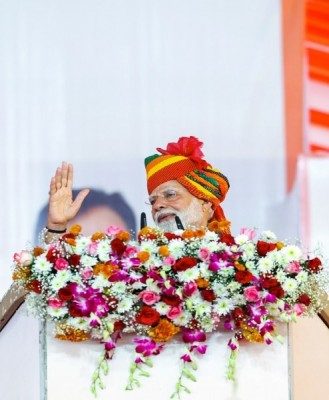
President calls for establishment of healthy ecosystem to harness innovative potential of population
A healthy eco-system can harness the innovative potential of the population.
The President said he is optimistic about the prospects of inclusive innovation in our country, however there are few concerns.
Education is the seed of a nation’s destiny. Without a strong foundation of education, ability of communities to benefit from other infrastructural resources for development remains limited. There is need for empathetic stress on inclusive innovation in our learning modules in education.
The President said many central institutions of higher learning – about 86 of them - have opened innovation clubs. These clubs search for inclusive innovations in the hinterland of their institutions spread the innovations developed; invite innovators to classrooms or labs to understand their motivation, and identify unmet needs of society and try to address them through their projects. Reciprocity and responsibility must become an inalienable part of learning exchanges between the formal and the informal sectors. He urged educational planners and thinkers to consider transformation of the pedagogic approach towards learning.
The President said the role of science and technology in leveraging inclusive innovations is evident when we see the pivotal contributions made by the Indian Space Research Organization. Early investment in science and technology has given us rich dividends. We need to continue providing impetus to science education and research in our institutions.
The President said developing an innovation culture is crucial. The INSPIRE-MANAK programme of the Department of Science and Technology envisages the mobilization of one million ideas from half a million schools at the rate of two ideas per school. This initiative will help build a spirit of creativity and ingenuity amongst young students. To make grassroots innovations more inclusive, we need a strong mechanism for dispersal and quick adoption of ideas. Many public-sector scientists do not charge any cost for the time used in validating and value-adding grassroots innovations. Many intellectual property firms also do the same. The concept of Technology Commons used by National Innovation Foundation allowing fellow community members to use innovative ideas of others for non-commercial purposes has also helped in wider dissemination of innovations. These positives should continue unabated.
The President said the benefit of innovation will accrue when an idea gets converted into a useful product. For that, a strong environment for starting new enterprises is necessary. Micro-venture finance and not just micro finance will help usher in entrepreneurial undertakings at the grassroots. We should simultaneously think of popularizing the in situ incubation model of innovation enterprises.
Earlier in the day, the Gandhian Young Technological Innovation (GYTI) Awards 2017 were conferred as part of the ‘Festival of Innovations’. The GYTI Awards is an initiative to foster youth driven innovations across India and are instituted by the Society for Research and Initiatives for Sustainable Technologies and Institutions (SRISTI) with support from the Biotechnology Industry Research Assistance Council (BIRAC).
GYTI Awards 2017 received 2,715 nominations from 308 Institutions & Universities belonging to 27 states and 2 Union Territories across 54 different subject disciplines. This year 22 innovations were selected for award and another 17 for appreciation. Under the BIRAC-SRISTI program, 15 GYTI awardees in medical and biotech innovations category will receive a grant of Rs 15 lakhs, to further develop their prototypes/proof of concepts. Another 100 students/others, for grassroots innovations and/or socially relevant solutions get a grant of Rs 1 lakh.
The second day of the Festival of Innovations also witnessed discussions on topics such as incubation and acceleration models for innovative start-ups, incentives for innovation in public policy and programmes as well as social innovations for large scale societal change.
Support Our Journalism
We cannot do without you.. your contribution supports unbiased journalism
IBNS is not driven by any ism- not wokeism, not racism, not skewed secularism, not hyper right-wing or left liberal ideals, nor by any hardline religious beliefs or hyper nationalism. We want to serve you good old objective news, as they are. We do not judge or preach. We let people decide for themselves. We only try to present factual and well-sourced news.







